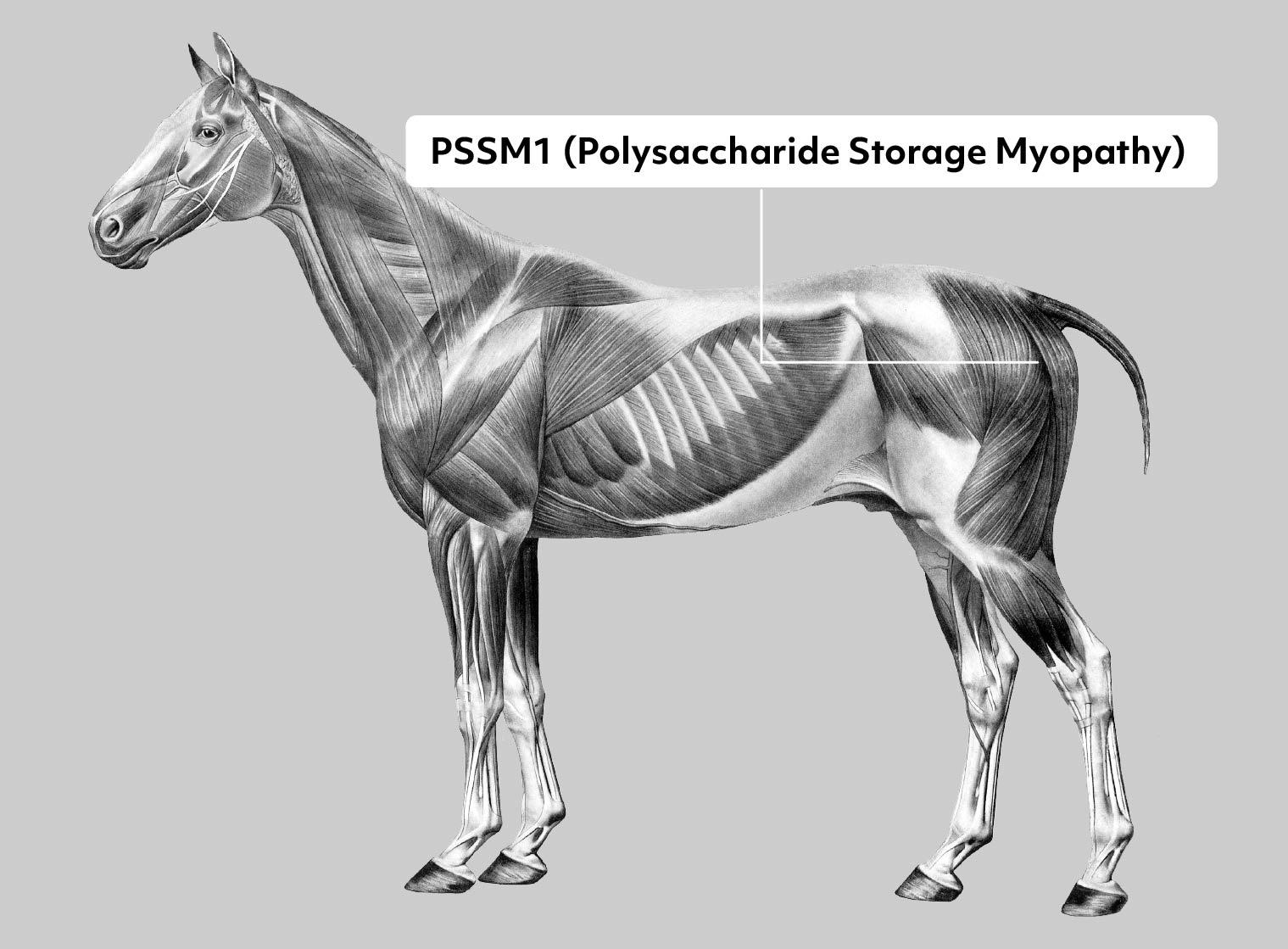Polysaccharide Storage Myopathy (PSSM1)
Gene or Region: GYS1
Reference Variant: C
Mutant Variant: T
Affected Breeds: Many
Research Confidence: High confidence - Findings reproduced multiple studies
Explanation of Results: PSSM1/PSSM1 = homozygous for Polysaccharide Storage Myopathy, extreme trait expressed PSSM1/n = heterozygous for Polysaccharide Storage Myopathy, trait expressed n/n = no variant detected
General Information for Polysaccharide Storage Myopathy (PSSM1)
Polysaccharide Storage Myopathy (PSSM) is a glycogen storage disorder in which affected horses have chronic episodes of exertional rhabdomyolysis (“tying-up”). Acute symptoms are an unwillingness to move and muscle damage following exercise. Heterozygous horses (PSSM1/n) experience more moderate symptoms that can usually be managed through a low-sugar/starch diet and exercise. However, homozygous horses (PSSM1/PSSM1) are generally more severely affected and are thus harder to manage. Additionally, one study has found that horses with PSSM1 and a malignant hyperthermia (MH) exhibit more severe clinical symptoms.
GYS1 is an enzyme involved in the production of glycogen that is found specifically within the muscle. Mutations in this gene have been associated with glycogen storage diseases in several species. This particular mutation is a single base substitution that alters an amino acid, likely affected the function of the encoded protein.
References
McCue ME et al., “Glycogen synthase (GYS1) mutation causes a novel skeletal muscle glycogenosis.” (2008) Genomics. 91: 458-66. PMID: 18358695
McCue ME et al., “Glycogen synthase 1 (GYS1) mutation in diverse breeds with polysaccharide storage myopathy.” (2008) J Vet Intern Med. 22: 1228-33. PMID: 18691366
Herszberg B et al., “A GYS1 gene mutation is highly associated with polysaccharide storage myopathy in Cob Normand draught horses.” (2009) Anim Genet. 40: 94-6. PMID: 18822097
McCue ME et al., “Polysaccharide storage myopathy phenotype in quarter horse-related breeds is modified by the presence of an RYR1 mutation.” (2009) Neuromuscul Disord. 19: 37-43. PMID: 19056269
Tryon RC et al., “Evaluation of allele frequencies of inherited disease genes in subgroups of American Quarter Horses.” (2009) J Am Vet Med Assoc. 234: 120-5. PMID: 19119976
Stanley RL et al., “A glycogen synthase 1 mutation associated with equine polysaccharide storage myopathy and exertional rhabdomyolysis occurs in a variety of UK breeds.” (2009) Equine Vet J. 41: 597-601. PMID: 19803057
Baird JD et al., “Presence of the glycogen synthase 1 (GYS1) mutation causing type 1 polysaccharide storage myopathy in continental European draught horse breeds.” (2010) Vet Rec. 167: 781-4. PMID: 21262610
McCoy AM et al., “Evidence of positive selection for a glycogen synthase (GYS1) mutation in domestic horse populations.” (2014) J Hered. 105: 163-72. PMID: 24215078
More Horse Health
"Warmblood" Fragile Foal Syndrome
"Warmblood" fragile foal syndrome (FFS) is a connective tissue disorder resulting in joint laxity and extremely thin skin that is only loosely connected to the body. The skin is easily torn, resulting in lacerations, hematomas, and seromas across the foal. Affected foals are euthanized shortly after birth.
Androgen Insensitivity Syndrome
Androgen Insensitivity Syndrome (AIS) is an X-linked disorder of sexual development resulting in a female horse with XY chromosomes. Horses with AIS exhibit stallion-like behavior such as agression toward other horses, Flehman response and vocalization toward cycling mares.
Cerebellar Abiotrophy
Cerebellar Abiotrophy (CA) is a degenerative neurological disorder, due to the death of neurons in the brain. Symptoms (head tremors, lack of coordination, wide stances, exaggerated gain, difficulty rising and startling easily), typically appear in foals between six weeks and four months of age.
Chronic Idiopathic Anhidrosis Risk
Chronic Idiopathic Anhidrosis Risk (CIA) is the inability to sweat in response to increased body temperature, (AKA "non-sweater"). This condition is dangerous and sometimes life-threatening for horses, who rely on sweating for 65-70% of their temperature regulation.
